Unit 2 How often do you exercise 教材全解及单元测试卷
文档属性
| 名称 | Unit 2 How often do you exercise 教材全解及单元测试卷 | 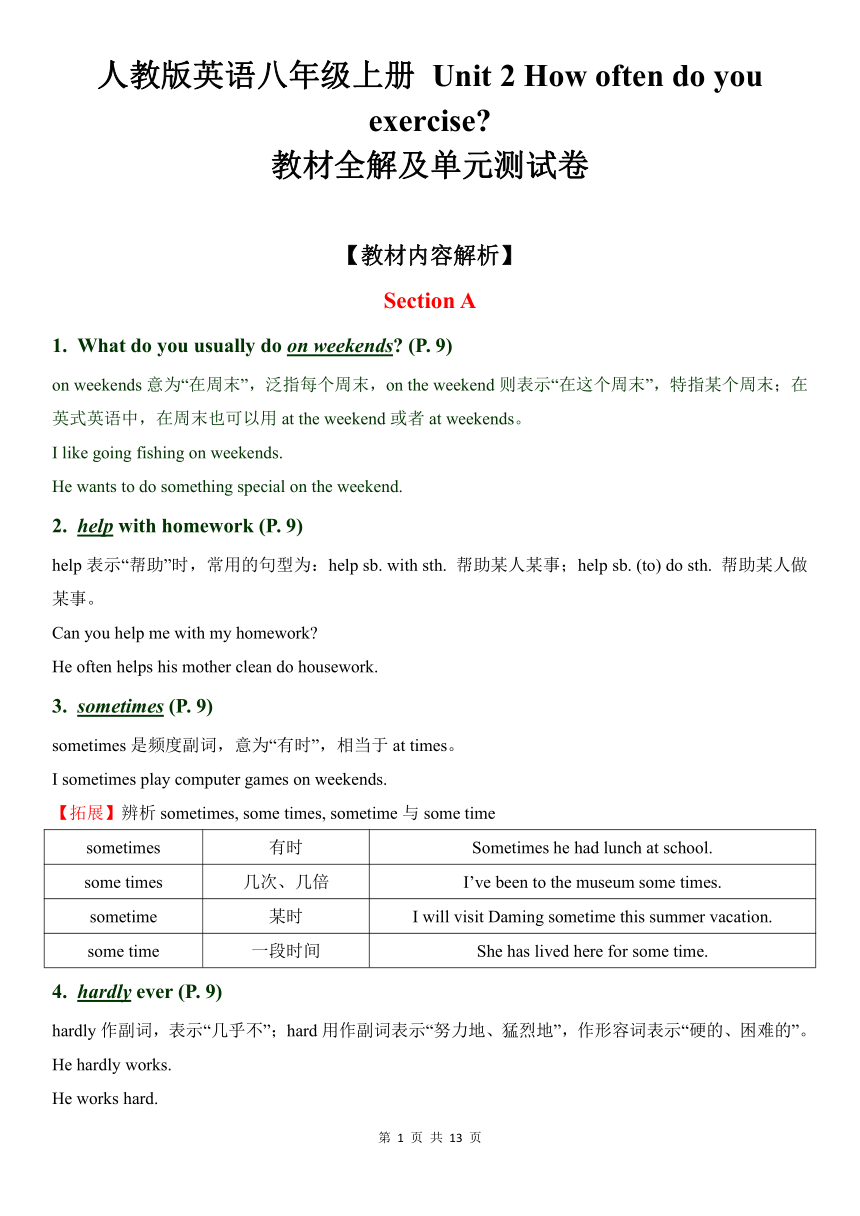 | |
| 格式 | docx | ||
| 文件大小 | 42.8KB | ||
| 资源类型 | 试卷 | ||
| 版本资源 | 人教新目标(Go for it)版 | ||
| 科目 | 英语 | ||
| 更新时间 | 2022-04-08 14:29:01 | ||
图片预览

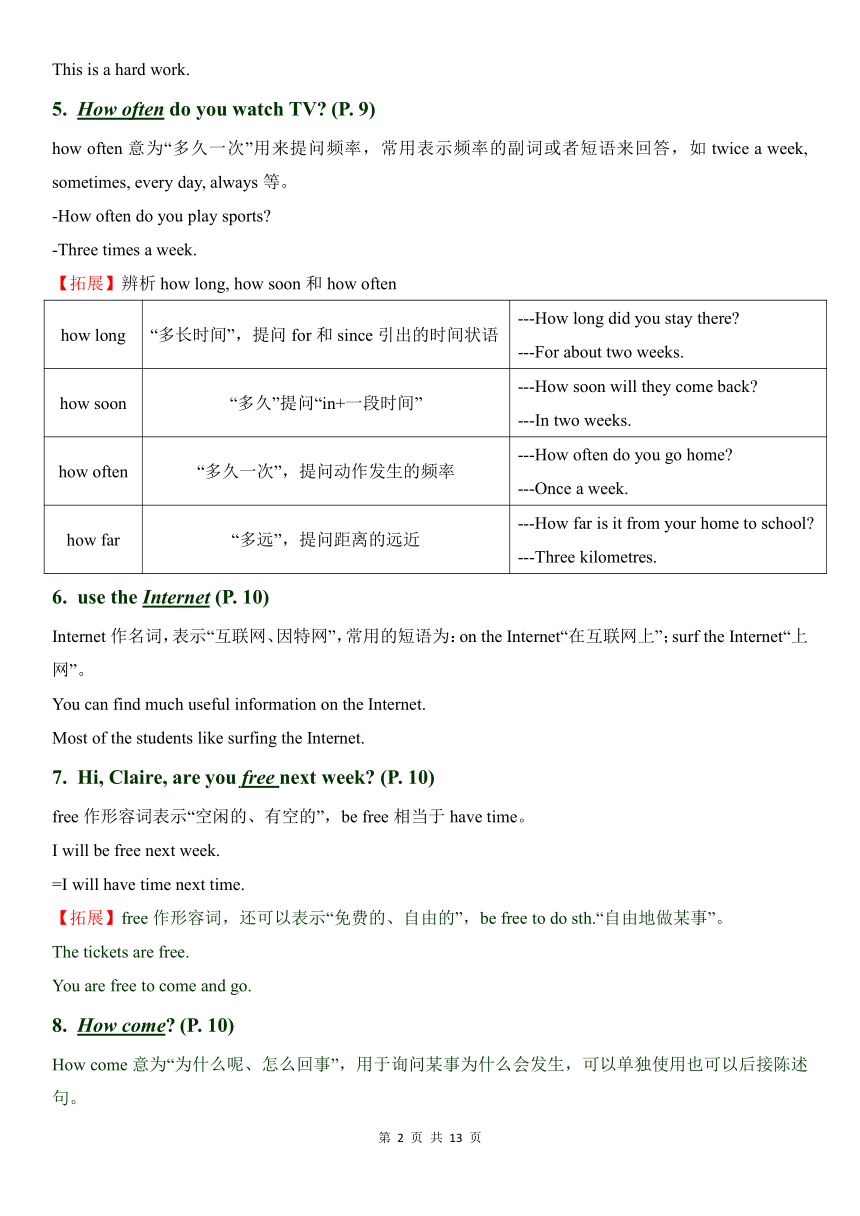
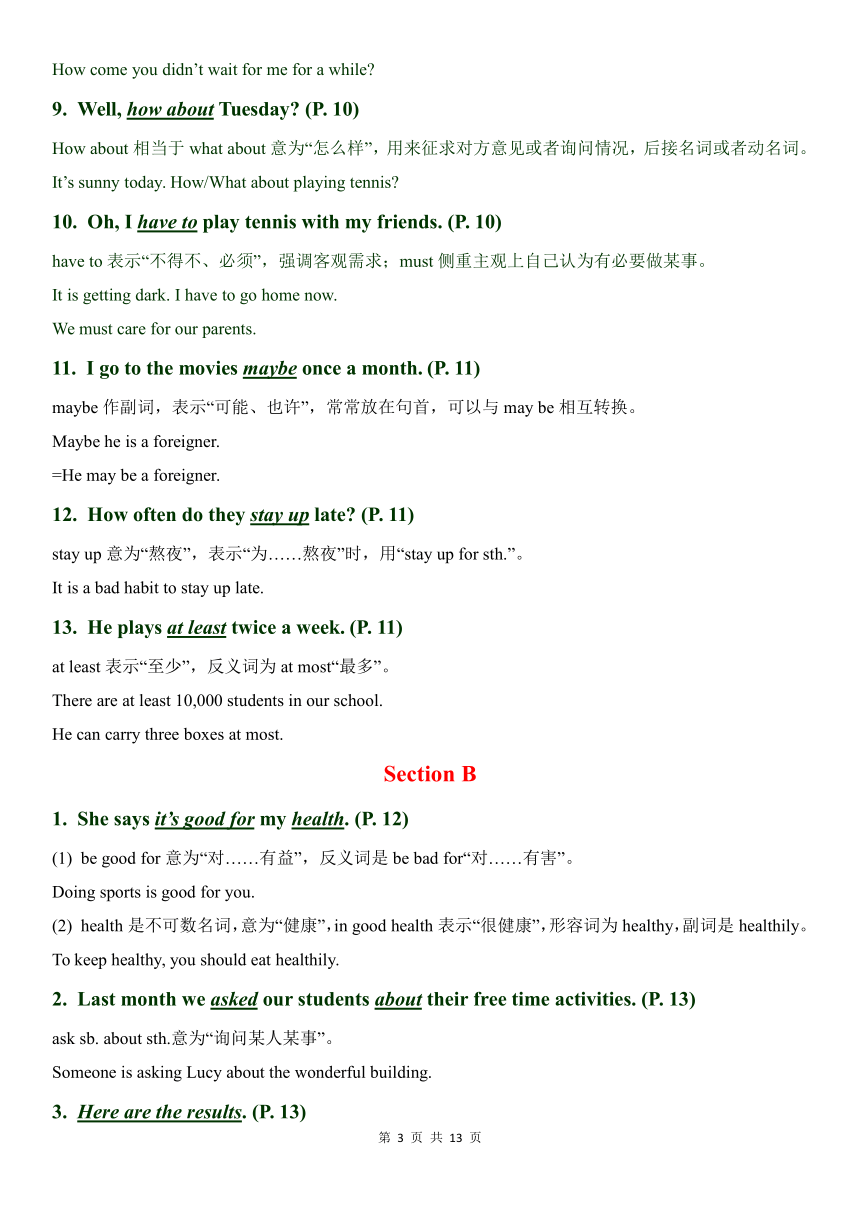
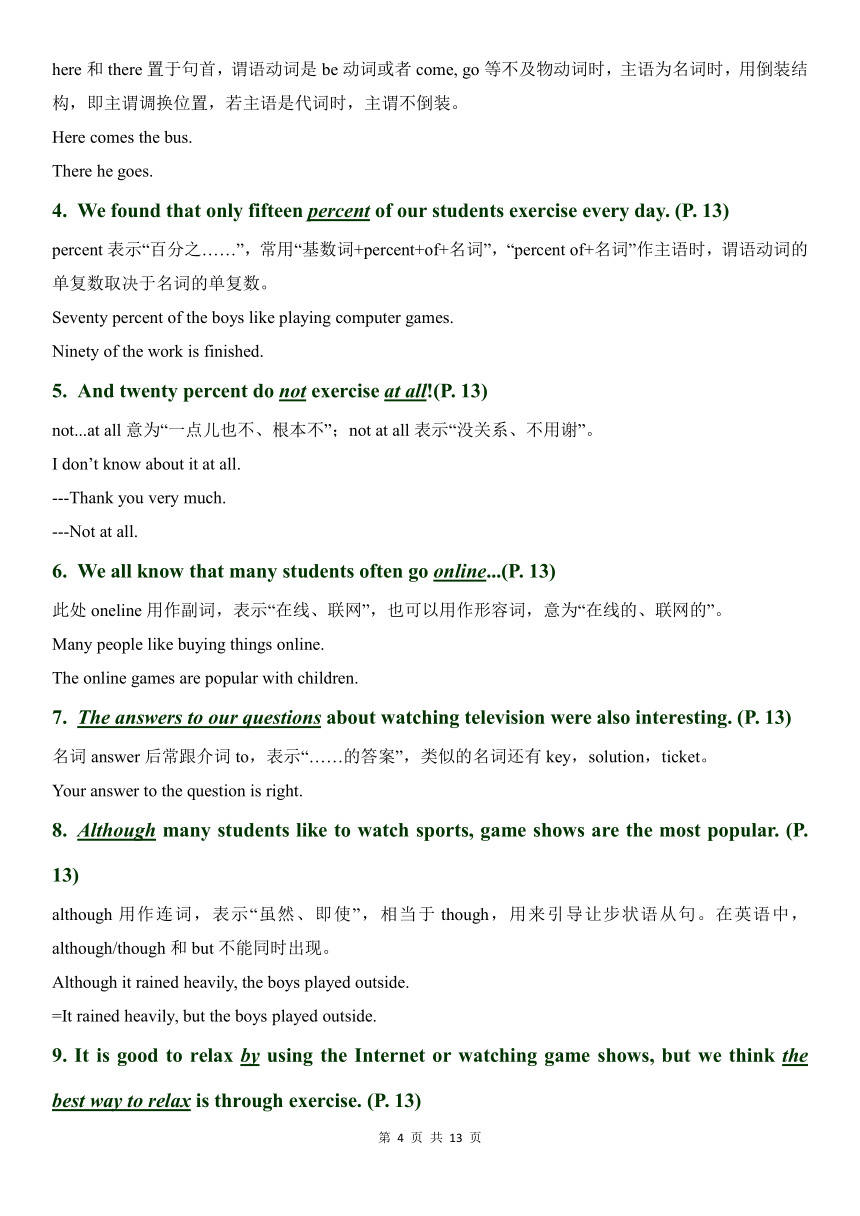
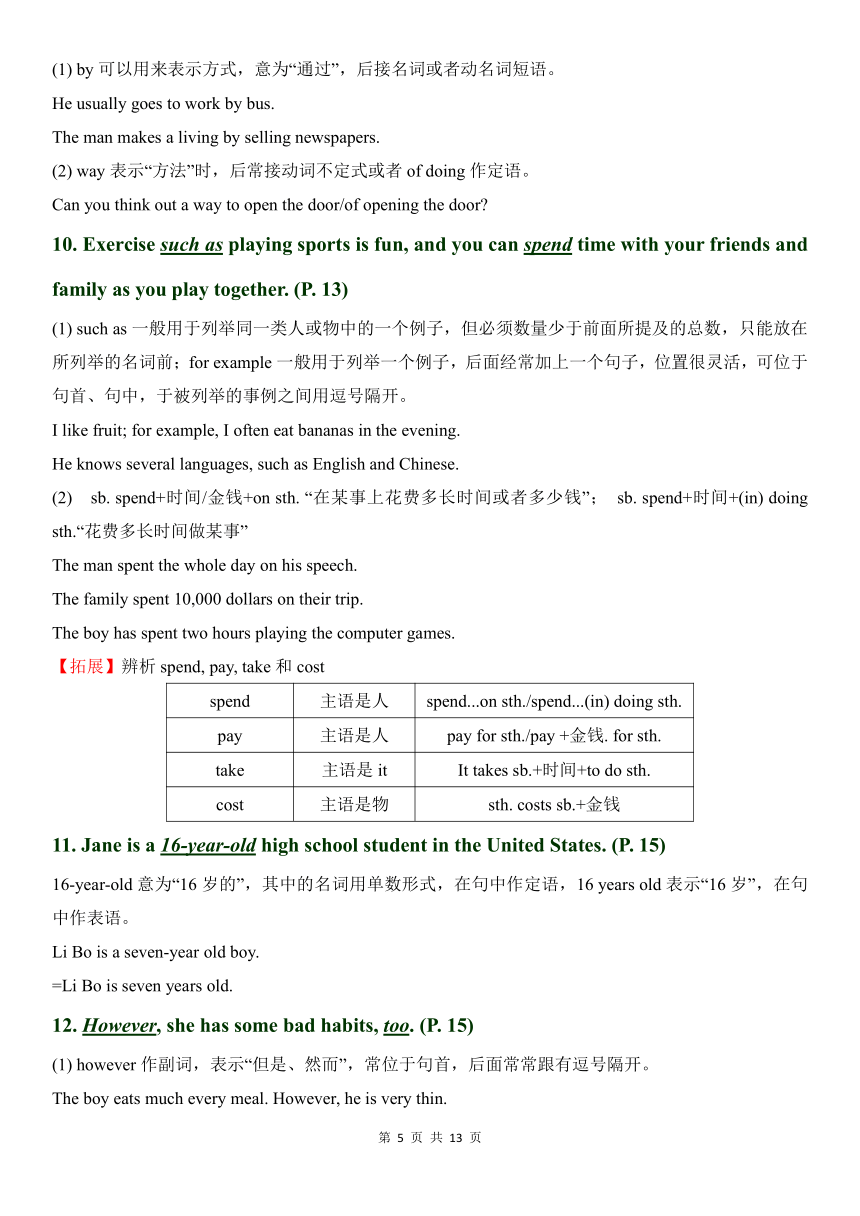
文档简介
人教版英语八年级上册 Unit 2 How often do you exercise
教材全解及单元测试卷
【教材内容解析】
Section A
What do you usually do on weekends (P. 9)
on weekends意为“在周末”,泛指每个周末,on the weekend则表示“在这个周末”,特指某个周末;在英式英语中,在周末也可以用at the weekend或者at weekends。
I like going fishing on weekends.
He wants to do something special on the weekend.
help with homework (P. 9)
help表示“帮助”时,常用的句型为:help sb. with sth. 帮助某人某事;help sb. (to) do sth. 帮助某人做某事。
Can you help me with my homework
He often helps his mother clean do housework.
sometimes (P. 9)
sometimes是频度副词,意为“有时”,相当于at times。
I sometimes play computer games on weekends.
【拓展】辨析sometimes, some times, sometime与some time
sometimes 有时 Sometimes he had lunch at school.
some times 几次、几倍 I’ve been to the museum some times.
sometime 某时 I will visit Daming sometime this summer vacation.
some time 一段时间 She has lived here for some time.
hardly ever (P. 9)
hardly作副词,表示“几乎不”;hard用作副词表示“努力地、猛烈地”,作形容词表示“硬的、困难的”。
He hardly works.
He works hard.
This is a hard work.
How often do you watch TV (P. 9)
how often意为“多久一次”用来提问频率,常用表示频率的副词或者短语来回答,如twice a week, sometimes, every day, always等。
-How often do you play sports
-Three times a week.
【拓展】辨析how long, how soon和how often
how long “多长时间”,提问for和since引出的时间状语 ---How long did you stay there ---For about two weeks.
how soon “多久”提问“in+一段时间” ---How soon will they come back ---In two weeks.
how often “多久一次”,提问动作发生的频率 ---How often do you go home ---Once a week.
how far “多远”,提问距离的远近 ---How far is it from your home to school ---Three kilometres.
use the Internet (P. 10)
Internet作名词,表示“互联网、因特网”,常用的短语为:on the Internet“在互联网上”;surf the Internet“上网”。
You can find much useful information on the Internet.
Most of the students like surfing the Internet.
Hi, Claire, are you free next week (P. 10)
free作形容词表示“空闲的、有空的”,be free相当于have time。
I will be free next week.
=I will have time next time.
【拓展】free作形容词,还可以表示“免费的、自由的”,be free to do sth.“自由地做某事”。
The tickets are free.
You are free to come and go.
How come (P. 10)
How come意为“为什么呢、怎么回事”,用于询问某事为什么会发生,可以单独使用也可以后接陈述句。
How come you didn’t wait for me for a while
Well, how about Tuesday (P. 10)
How about相当于what about意为“怎么样”,用来征求对方意见或者询问情况,后接名词或者动名词。
It’s sunny today. How/What about playing tennis
Oh, I have to play tennis with my friends. (P. 10)
have to表示“不得不、必须”,强调客观需求;must侧重主观上自己认为有必要做某事。
It is getting dark. I have to go home now.
We must care for our parents.
I go to the movies maybe once a month. (P. 11)
maybe作副词,表示“可能、也许”,常常放在句首,可以与may be相互转换。
Maybe he is a foreigner.
=He may be a foreigner.
How often do they stay up late (P. 11)
stay up意为“熬夜”,表示“为……熬夜”时,用“stay up for sth.”。
It is a bad habit to stay up late.
He plays at least twice a week. (P. 11)
at least表示“至少”,反义词为at most“最多”。
There are at least 10,000 students in our school.
He can carry three boxes at most.
Section B
She says it’s good for my health. (P. 12)
be good for意为“对……有益”,反义词是be bad for“对……有害”。
Doing sports is good for you.
health是不可数名词,意为“健康”,in good health表示“很健康”,形容词为healthy,副词是healthily。
To keep healthy, you should eat healthily.
Last month we asked our students about their free time activities. (P. 13)
ask sb. about sth.意为“询问某人某事”。
Someone is asking Lucy about the wonderful building.
Here are the results. (P. 13)
here和there置于句首,谓语动词是be动词或者come, go等不及物动词时,主语为名词时,用倒装结构,即主谓调换位置,若主语是代词时,主谓不倒装。
Here comes the bus.
There he goes.
We found that only fifteen percent of our students exercise every day. (P. 13)
percent表示“百分之……”,常用“基数词+percent+of+名词”,“percent of+名词”作主语时,谓语动词的单复数取决于名词的单复数。
Seventy percent of the boys like playing computer games.
Ninety of the work is finished.
And twenty percent do not exercise at all!(P. 13)
not...at all意为“一点儿也不、根本不”;not at all表示“没关系、不用谢”。
I don’t know about it at all.
---Thank you very much.
---Not at all.
We all know that many students often go online...(P. 13)
此处oneline用作副词,表示“在线、联网”,也可以用作形容词,意为“在线的、联网的”。
Many people like buying things online.
The online games are popular with children.
The answers to our questions about watching television were also interesting. (P. 13)
名词answer后常跟介词to,表示“……的答案”,类似的名词还有key,solution,ticket。
Your answer to the question is right.
Although many students like to watch sports, game shows are the most popular. (P. 13)
although用作连词,表示“虽然、即使”,相当于though,用来引导让步状语从句。在英语中,although/though和but不能同时出现。
Although it rained heavily, the boys played outside.
=It rained heavily, but the boys played outside.
9. It is good to relax by using the Internet or watching game shows, but we think the best way to relax is through exercise. (P. 13)
(1) by可以用来表示方式,意为“通过”,后接名词或者动名词短语。
He usually goes to work by bus.
The man makes a living by selling newspapers.
(2) way表示“方法”时,后常接动词不定式或者of doing作定语。
Can you think out a way to open the door/of opening the door
10. Exercise such as playing sports is fun, and you can spend time with your friends and family as you play together. (P. 13)
(1) such as一般用于列举同一类人或物中的一个例子,但必须数量少于前面所提及的总数,只能放在所列举的名词前;for example一般用于列举一个例子,后面经常加上一个句子,位置很灵活,可位于句首、句中,于被列举的事例之间用逗号隔开。
I like fruit; for example, I often eat bananas in the evening.
He knows several languages, such as English and Chinese.
(2) sb. spend+时间/金钱+on sth. “在某事上花费多长时间或者多少钱”; sb. spend+时间+(in) doing sth.“花费多长时间做某事”
The man spent the whole day on his speech.
The family spent 10,000 dollars on their trip.
The boy has spent two hours playing the computer games.
【拓展】辨析spend, pay, take和cost
spend 主语是人 spend...on sth./spend...(in) doing sth.
pay 主语是人 pay for sth./pay +金钱. for sth.
take 主语是it It takes sb.+时间+to do sth.
cost 主语是物 sth. costs sb.+金钱
11. Jane is a 16-year-old high school student in the United States. (P. 15)
16-year-old意为“16岁的”,其中的名词用单数形式,在句中作定语,16 years old表示“16岁”,在句中作表语。
Li Bo is a seven-year old boy.
=Li Bo is seven years old.
12. However, she has some bad habits, too. (P. 15)
(1) however作副词,表示“但是、然而”,常位于句首,后面常常跟有逗号隔开。
The boy eats much every meal. However, he is very thin.
(2) also, too, as well与either都可以表示“也”,但是用法不同。
also 放在句中行为动词前,be动词、助动词和情态动词之后。 He also wants to go.
too 用于肯定句中,放在句尾,前面用逗号隔开。 He wants to go, either.
as well 用于肯定句中,放在句尾,前面不用逗号隔开。 He wants to go as well.
either 用于否定句句末。 He doesn’t want to go either
13. She says she is afraid. (P. 15)
be afraid of意为“害怕、不敢”,后接名词、代词或者动名词。
She is afraid of snakes.
I was afraid of going through the woods.
[拓展]
be afraid to do sth. 意为“胆小不敢做某事”。
He was afraid to go out at night.
be afraid that...意为“担心、害怕”。
He was afraid that he would lose.
I’m afraid表示“恐怕”。
-Can we go there on time
-I am afraid not.
14. None (P. 16)
none表示“没有一个(人或物)”,是all“所有的人或物”的反义词,后常接介词of;另外,none强调某一类人或物数量的多少,常用来回答how many/much的提问;nobody(no one)/nothing强调个体,常用来回答what或者who的提问。
None of us agreed to his plan.
---How many students are there in the classroom
---None.
---Who is knocking at the door
---No one.
---Mum, I am a little hungry. I’d like some bread.
---Oh, there is none left in the bridge.
【重点短语和句型归纳】
重点短语
help with housework帮助做家务
on weekends=on the weekend在周末
how often多久一次
hardly ever几乎从不
once a week每周一次
be free =be available有空
go to the movies去看电影
on the Internet在网上
swing dance摇摆舞
play tennis打网球 play+球类/棋类/中国乐器 play the +西洋乐器 11.stay up late熬夜;睡得很晚
12.at least至少 at most最多
13.have/take dance and piano lessons上舞蹈课和钢琴课
14.go to bed early早点睡觉
15. play sports=do sports进行体育活动
16. be good for对…有好处
17.go camping去野营
18. not…at all一点儿也不……
19.in one’s free time在某人的业余时间
20.the answers to the questions 问题的答案
21.such as比如;诸如
22.go to the dentist去看牙医
23.more than多于;超过 less than少于
重点句型
help sb. with sth.帮助某人做某事
2.How about doing… =what about doing ......怎么样?
3.want sb. to do sth.想让某人做某事
4.How many+可数名词复数+一般疑问句? 有多少…
5.主语+find+that从句. ……发现……
6.spend time with sb.和某人一起度过时光
7.It’s+ adj.+(for sb)+ to do sth. 对某人来说,做某事是……的。
8. ask sb. about sth.向某人询问某事
9.by doing sth. 通过做某事(回答how引导的疑问句)
10.What’s your favorite… 你最喜爱的…是什么?
11.the best way to do sth.做某事的最好方式
12.How come 怎么回事?
【语法讲解】
频度副词
一、频度副词的含义
英语中常见的频度副词有usually, sometimes, always, often, seldom, never等,它们用来表示动作发生的频率,但是在程度上有所区别,频率由高到低依次是:always>usually>often>sometimes>seldom>never。频度副词放在be动词、情态动词和助动词之后,实义动词之前,对频率的提问用how often。
He’s always busy.
I never play a trick on others.
Sometimes I go to school by bus.
二、频度副词在句中的位置
频度副词一般放在实义动词之前,be动词、情态动词和助动词之后。
Lucy is sometimes busy.
I can hardly say a word.
They often have coffee at night.
【单元测试卷】
一.单项选择. 20分
( ) 1.--How often ______ she exercise --Twice a week.
A. do B. does C. doing D. did
( ) 2. –_______does he do on weekends —He usually does his homework.
A.What B.How C.When D. Who
( ) 3. Good food and exercise ______ me to study better.
A. help B. helps C. helping D. to help
( ) 4.Is her lifestyle the same ______ yours or different
A. as B. in C. at D. to
( ) 5. –How often were you late for school last term, James
--_______.I got to school early every day.
A. Always B.Sometimes C.Usually D.Never
( ) 6.She ________ever exercises on weekends
A. hard B.hardly C.never D.often
( )7.Katrina watches TV once ______ week.
A.the B.a C./ D.an
( )8. Please drink some milk. It’s good ______your health.
A. to B. for C. at D. with
( )9. ______I have one healthy habit, ______I’m not very healthy.
A . Although , but B. Although, / C .Although ,so D. but , /
( )10.—What’s your favorite __________ —Voice of China.
A.subject B.program C.song D.music
( )11.Next week is ________for me, I have no time to go with you.
A.full B.free C.expensive D.fun
( )12.--_________do you read English --Every day .
A.How long B.How old C.How often D.How many
( )13.Eating ________food can help us keep in good_________.
A.health , health B.health , healthy C.healthy , health D.healthy, healthy
( )14.--Would you like to have some milk --Thank you , but just _____.
A.few B.a few C.little D.a little
( )15.Three _______of the students ________TV every day.
A.percent, watches B.percents ,watch C.percent, watch D.percents, watches
( )16.Lucy often goes shopping three _______four ________a week.
A.or ,time B.and ,time C.and, times D.or , times
( )17.I enjoy learning English , _______it takes me a lot of time.
A.because B.for C.although D.or
( )18.Bill’s mother wants him ______milk every day .
A.drink B.drinks C.to drink D.drinking
( )19.Mike exercises every day , so he looks very _______.
A.health B.healthy C.healthily D.unhealthy
( )20.—How do you relax in your free time --_________using the Internet.
A.By B.With C.In D.On
二.根据汉语提示或首写字母补全单词。15分
1.My father often works outside but my mother often does the h____________at home.
2.I am busy with my homework every day , so I h__________ever watch TV.
3.We don’t go to school on w___________.
4.Her sister dances ___________(一次) a week, only on Sunday morning.
5. Sam’s eating _____________(习惯) are pretty good .
6. The box is __________(充满)of books. Can you help me carry it?
7.J__________ food is not good for us.
8.Eating too much hot food is bad for our ____________(健康).
9.Look! The birds are _____________(喝) water over there.
10.The r____________ of the English test made us very happy.
11.He was sad because his grandpa d___________.
12.A____________he is still 4 years old, he can sing well.
13.Do you like using the ______________(因特网)?
14.She reads English ______________(杂志) every day.
15.Would you like some ____________(果汁)
三.用所给词的适当形式填空。15分
1.My mother shops ____________(two) a week .
2.____________(sometime) she reads English books in the morning .
3.The young man____________(exercise) every morning.
4.I watch TV four _____________(time) a week .
5.Do you do eye ______________(exercise) every day
6.How about____________(read) English books
7.My parents don’t want me ____________(play) computer games.
8.How many ___________(movie) do you watch every year
9.There are some _____________(different) between the two pictures .
10.Mo Yan is a very great _____________(write).
11.The best way ______________(exercise) is to run every day.
12.Liu Li learns English by _____________(use) the Internet.
13.Do you know the use of ____________(listen) to music
14.She usually sleeps ___________(little) than eight hours at night.
15.___________food is good for our____________.(health)
四.用恰当的词补全对话。10分
A:What do you usually ________on weekends
B:I usually __________TV and ________English books , what _______ you
A:I usually do exercise , so I’m strong but not heavy .
B:________ _________do you exercise
A:Four __________a week .
B:What’s your ____________drink , Lucy
A:Milk , do you like it
B:I can’t stand milk. It’s awful. But my mother wants me to _________it .She says milk is good __________my health .
A:Yes , she is right .
五.句型转换。10分
1.Mary visits her grandparents three times a month .(对画线部分提问)
_________________________________________________________
2.She often watches TV at home. (对画线部分提问)
_________________________________________________________
3.I usually play soccer on Sundays . (对画线部分提问)
_________________________________________________________
4.The little boy eats junk food every day.(改为一般疑问句)
_________________________________________________________
5.My lifestyle is different from yours .(改为同义句)
My lifestyle ______ ________ ________ ________ yours .
六.完形填空。10分
Do you have a healthy lifestyle I think I 1 . First, I have many good eating habits . I like junk food, 2 I hardly eat it. I eat fruit and vegetables every day. 3 they are not very delicious, they are 4 for health. Second, I do 5 every day . It says that if people run every day, they will have more healthy hearts(心脏) than others . So I run for 6 thirty minutes every morning.
7 , I have good living habits. I try to 8 eight hours every day. That 9 me to be energetic(精力充沛的) the next day . And I can study better and get good grades.
What do you 10 my lifestyle Can you learn something from it
( )1.A.do B.am C.like D.make
( )2.A.and B.but C.so D.or
( )3.A.Maybe B.Although C.Because D.If
( )4.A.bad B.late C.hard D.good
( )5.A.cleaning B.homework C.exercise D.reading
( )6.A.at B.about C.on D.in
( )7.A.First B.Second C.Third D.Fourth
( )8.A.sleep B.practice C.spend D.drink
( )9.A.stops B.makes C.helps D.asks
( )10.A.look at B.think of C.talk about D.agree with
七.阅读理解。10分。
John is a paper boy. He delivers(投递)newspapers to different houses in his street every day. He has about 80 customers(客户). Half of his customers only take the newspapers on weekdays, and about half take the newspapers on weekdays and on Sundays. Two of John’s customers only take the newspapers on Sundays.
John has to get up at 4:30 every morning to deliver his newspapers. It takes longer to deliver the newspapers on Sundays. The Sunday newspapers are twice as heavy as those on weekdays.
John is saving his money to buy a new bicycle. He is also saving money for college (大学). He has already saved 500 dollars.
( )1. John ________ every day.
A. reads books B. sells newspapers C. borrows books D. delivers newspapers
( )2. How many customers does he have
A. About 40. B. About 120. C. About 80. D. About 20.
( )3. _______ of his customers only take the newspapers on Sundays.
A. Two B. Eighty C. Forty D. Twenty
( )4. What time does he have to get up every morning
A. 3:30 B. 4:30 C. 5:30 D. 6:30
( )5. John is saving his money to buy __________________.
A. a newspaper B. a new bag C. a house D. a new bicycle
八.书面表达。10分
用所给的关键词写一篇短文描述你的生活习惯,至少60个单词.
often, sometimes, never, always, hardly ever, once a week, twice a month.
___________________________________________________________________________________________________________________________________________________________________________________________________________________________________________________________________________________________________________________________________________________________________________________________________________________________________________________
_____________________________________________________________________________________________________________________________________________________________________________________________________________________________________________________________________
教材全解及单元测试卷
【教材内容解析】
Section A
What do you usually do on weekends (P. 9)
on weekends意为“在周末”,泛指每个周末,on the weekend则表示“在这个周末”,特指某个周末;在英式英语中,在周末也可以用at the weekend或者at weekends。
I like going fishing on weekends.
He wants to do something special on the weekend.
help with homework (P. 9)
help表示“帮助”时,常用的句型为:help sb. with sth. 帮助某人某事;help sb. (to) do sth. 帮助某人做某事。
Can you help me with my homework
He often helps his mother clean do housework.
sometimes (P. 9)
sometimes是频度副词,意为“有时”,相当于at times。
I sometimes play computer games on weekends.
【拓展】辨析sometimes, some times, sometime与some time
sometimes 有时 Sometimes he had lunch at school.
some times 几次、几倍 I’ve been to the museum some times.
sometime 某时 I will visit Daming sometime this summer vacation.
some time 一段时间 She has lived here for some time.
hardly ever (P. 9)
hardly作副词,表示“几乎不”;hard用作副词表示“努力地、猛烈地”,作形容词表示“硬的、困难的”。
He hardly works.
He works hard.
This is a hard work.
How often do you watch TV (P. 9)
how often意为“多久一次”用来提问频率,常用表示频率的副词或者短语来回答,如twice a week, sometimes, every day, always等。
-How often do you play sports
-Three times a week.
【拓展】辨析how long, how soon和how often
how long “多长时间”,提问for和since引出的时间状语 ---How long did you stay there ---For about two weeks.
how soon “多久”提问“in+一段时间” ---How soon will they come back ---In two weeks.
how often “多久一次”,提问动作发生的频率 ---How often do you go home ---Once a week.
how far “多远”,提问距离的远近 ---How far is it from your home to school ---Three kilometres.
use the Internet (P. 10)
Internet作名词,表示“互联网、因特网”,常用的短语为:on the Internet“在互联网上”;surf the Internet“上网”。
You can find much useful information on the Internet.
Most of the students like surfing the Internet.
Hi, Claire, are you free next week (P. 10)
free作形容词表示“空闲的、有空的”,be free相当于have time。
I will be free next week.
=I will have time next time.
【拓展】free作形容词,还可以表示“免费的、自由的”,be free to do sth.“自由地做某事”。
The tickets are free.
You are free to come and go.
How come (P. 10)
How come意为“为什么呢、怎么回事”,用于询问某事为什么会发生,可以单独使用也可以后接陈述句。
How come you didn’t wait for me for a while
Well, how about Tuesday (P. 10)
How about相当于what about意为“怎么样”,用来征求对方意见或者询问情况,后接名词或者动名词。
It’s sunny today. How/What about playing tennis
Oh, I have to play tennis with my friends. (P. 10)
have to表示“不得不、必须”,强调客观需求;must侧重主观上自己认为有必要做某事。
It is getting dark. I have to go home now.
We must care for our parents.
I go to the movies maybe once a month. (P. 11)
maybe作副词,表示“可能、也许”,常常放在句首,可以与may be相互转换。
Maybe he is a foreigner.
=He may be a foreigner.
How often do they stay up late (P. 11)
stay up意为“熬夜”,表示“为……熬夜”时,用“stay up for sth.”。
It is a bad habit to stay up late.
He plays at least twice a week. (P. 11)
at least表示“至少”,反义词为at most“最多”。
There are at least 10,000 students in our school.
He can carry three boxes at most.
Section B
She says it’s good for my health. (P. 12)
be good for意为“对……有益”,反义词是be bad for“对……有害”。
Doing sports is good for you.
health是不可数名词,意为“健康”,in good health表示“很健康”,形容词为healthy,副词是healthily。
To keep healthy, you should eat healthily.
Last month we asked our students about their free time activities. (P. 13)
ask sb. about sth.意为“询问某人某事”。
Someone is asking Lucy about the wonderful building.
Here are the results. (P. 13)
here和there置于句首,谓语动词是be动词或者come, go等不及物动词时,主语为名词时,用倒装结构,即主谓调换位置,若主语是代词时,主谓不倒装。
Here comes the bus.
There he goes.
We found that only fifteen percent of our students exercise every day. (P. 13)
percent表示“百分之……”,常用“基数词+percent+of+名词”,“percent of+名词”作主语时,谓语动词的单复数取决于名词的单复数。
Seventy percent of the boys like playing computer games.
Ninety of the work is finished.
And twenty percent do not exercise at all!(P. 13)
not...at all意为“一点儿也不、根本不”;not at all表示“没关系、不用谢”。
I don’t know about it at all.
---Thank you very much.
---Not at all.
We all know that many students often go online...(P. 13)
此处oneline用作副词,表示“在线、联网”,也可以用作形容词,意为“在线的、联网的”。
Many people like buying things online.
The online games are popular with children.
The answers to our questions about watching television were also interesting. (P. 13)
名词answer后常跟介词to,表示“……的答案”,类似的名词还有key,solution,ticket。
Your answer to the question is right.
Although many students like to watch sports, game shows are the most popular. (P. 13)
although用作连词,表示“虽然、即使”,相当于though,用来引导让步状语从句。在英语中,although/though和but不能同时出现。
Although it rained heavily, the boys played outside.
=It rained heavily, but the boys played outside.
9. It is good to relax by using the Internet or watching game shows, but we think the best way to relax is through exercise. (P. 13)
(1) by可以用来表示方式,意为“通过”,后接名词或者动名词短语。
He usually goes to work by bus.
The man makes a living by selling newspapers.
(2) way表示“方法”时,后常接动词不定式或者of doing作定语。
Can you think out a way to open the door/of opening the door
10. Exercise such as playing sports is fun, and you can spend time with your friends and family as you play together. (P. 13)
(1) such as一般用于列举同一类人或物中的一个例子,但必须数量少于前面所提及的总数,只能放在所列举的名词前;for example一般用于列举一个例子,后面经常加上一个句子,位置很灵活,可位于句首、句中,于被列举的事例之间用逗号隔开。
I like fruit; for example, I often eat bananas in the evening.
He knows several languages, such as English and Chinese.
(2) sb. spend+时间/金钱+on sth. “在某事上花费多长时间或者多少钱”; sb. spend+时间+(in) doing sth.“花费多长时间做某事”
The man spent the whole day on his speech.
The family spent 10,000 dollars on their trip.
The boy has spent two hours playing the computer games.
【拓展】辨析spend, pay, take和cost
spend 主语是人 spend...on sth./spend...(in) doing sth.
pay 主语是人 pay for sth./pay +金钱. for sth.
take 主语是it It takes sb.+时间+to do sth.
cost 主语是物 sth. costs sb.+金钱
11. Jane is a 16-year-old high school student in the United States. (P. 15)
16-year-old意为“16岁的”,其中的名词用单数形式,在句中作定语,16 years old表示“16岁”,在句中作表语。
Li Bo is a seven-year old boy.
=Li Bo is seven years old.
12. However, she has some bad habits, too. (P. 15)
(1) however作副词,表示“但是、然而”,常位于句首,后面常常跟有逗号隔开。
The boy eats much every meal. However, he is very thin.
(2) also, too, as well与either都可以表示“也”,但是用法不同。
also 放在句中行为动词前,be动词、助动词和情态动词之后。 He also wants to go.
too 用于肯定句中,放在句尾,前面用逗号隔开。 He wants to go, either.
as well 用于肯定句中,放在句尾,前面不用逗号隔开。 He wants to go as well.
either 用于否定句句末。 He doesn’t want to go either
13. She says she is afraid. (P. 15)
be afraid of意为“害怕、不敢”,后接名词、代词或者动名词。
She is afraid of snakes.
I was afraid of going through the woods.
[拓展]
be afraid to do sth. 意为“胆小不敢做某事”。
He was afraid to go out at night.
be afraid that...意为“担心、害怕”。
He was afraid that he would lose.
I’m afraid表示“恐怕”。
-Can we go there on time
-I am afraid not.
14. None (P. 16)
none表示“没有一个(人或物)”,是all“所有的人或物”的反义词,后常接介词of;另外,none强调某一类人或物数量的多少,常用来回答how many/much的提问;nobody(no one)/nothing强调个体,常用来回答what或者who的提问。
None of us agreed to his plan.
---How many students are there in the classroom
---None.
---Who is knocking at the door
---No one.
---Mum, I am a little hungry. I’d like some bread.
---Oh, there is none left in the bridge.
【重点短语和句型归纳】
重点短语
help with housework帮助做家务
on weekends=on the weekend在周末
how often多久一次
hardly ever几乎从不
once a week每周一次
be free =be available有空
go to the movies去看电影
on the Internet在网上
swing dance摇摆舞
play tennis打网球 play+球类/棋类/中国乐器 play the +西洋乐器 11.stay up late熬夜;睡得很晚
12.at least至少 at most最多
13.have/take dance and piano lessons上舞蹈课和钢琴课
14.go to bed early早点睡觉
15. play sports=do sports进行体育活动
16. be good for对…有好处
17.go camping去野营
18. not…at all一点儿也不……
19.in one’s free time在某人的业余时间
20.the answers to the questions 问题的答案
21.such as比如;诸如
22.go to the dentist去看牙医
23.more than多于;超过 less than少于
重点句型
help sb. with sth.帮助某人做某事
2.How about doing… =what about doing ......怎么样?
3.want sb. to do sth.想让某人做某事
4.How many+可数名词复数+一般疑问句? 有多少…
5.主语+find+that从句. ……发现……
6.spend time with sb.和某人一起度过时光
7.It’s+ adj.+(for sb)+ to do sth. 对某人来说,做某事是……的。
8. ask sb. about sth.向某人询问某事
9.by doing sth. 通过做某事(回答how引导的疑问句)
10.What’s your favorite… 你最喜爱的…是什么?
11.the best way to do sth.做某事的最好方式
12.How come 怎么回事?
【语法讲解】
频度副词
一、频度副词的含义
英语中常见的频度副词有usually, sometimes, always, often, seldom, never等,它们用来表示动作发生的频率,但是在程度上有所区别,频率由高到低依次是:always>usually>often>sometimes>seldom>never。频度副词放在be动词、情态动词和助动词之后,实义动词之前,对频率的提问用how often。
He’s always busy.
I never play a trick on others.
Sometimes I go to school by bus.
二、频度副词在句中的位置
频度副词一般放在实义动词之前,be动词、情态动词和助动词之后。
Lucy is sometimes busy.
I can hardly say a word.
They often have coffee at night.
【单元测试卷】
一.单项选择. 20分
( ) 1.--How often ______ she exercise --Twice a week.
A. do B. does C. doing D. did
( ) 2. –_______does he do on weekends —He usually does his homework.
A.What B.How C.When D. Who
( ) 3. Good food and exercise ______ me to study better.
A. help B. helps C. helping D. to help
( ) 4.Is her lifestyle the same ______ yours or different
A. as B. in C. at D. to
( ) 5. –How often were you late for school last term, James
--_______.I got to school early every day.
A. Always B.Sometimes C.Usually D.Never
( ) 6.She ________ever exercises on weekends
A. hard B.hardly C.never D.often
( )7.Katrina watches TV once ______ week.
A.the B.a C./ D.an
( )8. Please drink some milk. It’s good ______your health.
A. to B. for C. at D. with
( )9. ______I have one healthy habit, ______I’m not very healthy.
A . Although , but B. Although, / C .Although ,so D. but , /
( )10.—What’s your favorite __________ —Voice of China.
A.subject B.program C.song D.music
( )11.Next week is ________for me, I have no time to go with you.
A.full B.free C.expensive D.fun
( )12.--_________do you read English --Every day .
A.How long B.How old C.How often D.How many
( )13.Eating ________food can help us keep in good_________.
A.health , health B.health , healthy C.healthy , health D.healthy, healthy
( )14.--Would you like to have some milk --Thank you , but just _____.
A.few B.a few C.little D.a little
( )15.Three _______of the students ________TV every day.
A.percent, watches B.percents ,watch C.percent, watch D.percents, watches
( )16.Lucy often goes shopping three _______four ________a week.
A.or ,time B.and ,time C.and, times D.or , times
( )17.I enjoy learning English , _______it takes me a lot of time.
A.because B.for C.although D.or
( )18.Bill’s mother wants him ______milk every day .
A.drink B.drinks C.to drink D.drinking
( )19.Mike exercises every day , so he looks very _______.
A.health B.healthy C.healthily D.unhealthy
( )20.—How do you relax in your free time --_________using the Internet.
A.By B.With C.In D.On
二.根据汉语提示或首写字母补全单词。15分
1.My father often works outside but my mother often does the h____________at home.
2.I am busy with my homework every day , so I h__________ever watch TV.
3.We don’t go to school on w___________.
4.Her sister dances ___________(一次) a week, only on Sunday morning.
5. Sam’s eating _____________(习惯) are pretty good .
6. The box is __________(充满)of books. Can you help me carry it?
7.J__________ food is not good for us.
8.Eating too much hot food is bad for our ____________(健康).
9.Look! The birds are _____________(喝) water over there.
10.The r____________ of the English test made us very happy.
11.He was sad because his grandpa d___________.
12.A____________he is still 4 years old, he can sing well.
13.Do you like using the ______________(因特网)?
14.She reads English ______________(杂志) every day.
15.Would you like some ____________(果汁)
三.用所给词的适当形式填空。15分
1.My mother shops ____________(two) a week .
2.____________(sometime) she reads English books in the morning .
3.The young man____________(exercise) every morning.
4.I watch TV four _____________(time) a week .
5.Do you do eye ______________(exercise) every day
6.How about____________(read) English books
7.My parents don’t want me ____________(play) computer games.
8.How many ___________(movie) do you watch every year
9.There are some _____________(different) between the two pictures .
10.Mo Yan is a very great _____________(write).
11.The best way ______________(exercise) is to run every day.
12.Liu Li learns English by _____________(use) the Internet.
13.Do you know the use of ____________(listen) to music
14.She usually sleeps ___________(little) than eight hours at night.
15.___________food is good for our____________.(health)
四.用恰当的词补全对话。10分
A:What do you usually ________on weekends
B:I usually __________TV and ________English books , what _______ you
A:I usually do exercise , so I’m strong but not heavy .
B:________ _________do you exercise
A:Four __________a week .
B:What’s your ____________drink , Lucy
A:Milk , do you like it
B:I can’t stand milk. It’s awful. But my mother wants me to _________it .She says milk is good __________my health .
A:Yes , she is right .
五.句型转换。10分
1.Mary visits her grandparents three times a month .(对画线部分提问)
_________________________________________________________
2.She often watches TV at home. (对画线部分提问)
_________________________________________________________
3.I usually play soccer on Sundays . (对画线部分提问)
_________________________________________________________
4.The little boy eats junk food every day.(改为一般疑问句)
_________________________________________________________
5.My lifestyle is different from yours .(改为同义句)
My lifestyle ______ ________ ________ ________ yours .
六.完形填空。10分
Do you have a healthy lifestyle I think I 1 . First, I have many good eating habits . I like junk food, 2 I hardly eat it. I eat fruit and vegetables every day. 3 they are not very delicious, they are 4 for health. Second, I do 5 every day . It says that if people run every day, they will have more healthy hearts(心脏) than others . So I run for 6 thirty minutes every morning.
7 , I have good living habits. I try to 8 eight hours every day. That 9 me to be energetic(精力充沛的) the next day . And I can study better and get good grades.
What do you 10 my lifestyle Can you learn something from it
( )1.A.do B.am C.like D.make
( )2.A.and B.but C.so D.or
( )3.A.Maybe B.Although C.Because D.If
( )4.A.bad B.late C.hard D.good
( )5.A.cleaning B.homework C.exercise D.reading
( )6.A.at B.about C.on D.in
( )7.A.First B.Second C.Third D.Fourth
( )8.A.sleep B.practice C.spend D.drink
( )9.A.stops B.makes C.helps D.asks
( )10.A.look at B.think of C.talk about D.agree with
七.阅读理解。10分。
John is a paper boy. He delivers(投递)newspapers to different houses in his street every day. He has about 80 customers(客户). Half of his customers only take the newspapers on weekdays, and about half take the newspapers on weekdays and on Sundays. Two of John’s customers only take the newspapers on Sundays.
John has to get up at 4:30 every morning to deliver his newspapers. It takes longer to deliver the newspapers on Sundays. The Sunday newspapers are twice as heavy as those on weekdays.
John is saving his money to buy a new bicycle. He is also saving money for college (大学). He has already saved 500 dollars.
( )1. John ________ every day.
A. reads books B. sells newspapers C. borrows books D. delivers newspapers
( )2. How many customers does he have
A. About 40. B. About 120. C. About 80. D. About 20.
( )3. _______ of his customers only take the newspapers on Sundays.
A. Two B. Eighty C. Forty D. Twenty
( )4. What time does he have to get up every morning
A. 3:30 B. 4:30 C. 5:30 D. 6:30
( )5. John is saving his money to buy __________________.
A. a newspaper B. a new bag C. a house D. a new bicycle
八.书面表达。10分
用所给的关键词写一篇短文描述你的生活习惯,至少60个单词.
often, sometimes, never, always, hardly ever, once a week, twice a month.
___________________________________________________________________________________________________________________________________________________________________________________________________________________________________________________________________________________________________________________________________________________________________________________________________________________________________________________
_____________________________________________________________________________________________________________________________________________________________________________________________________________________________________________________________________
同课章节目录
- Unit 1 Where did you go on vacation?
- Section A
- Section B
- Unit 2 How often do you exercise?
- Section A
- Section B
- Unit 3 I'm more outgoing than my sister.
- Section A
- Section B
- Unit 4 What's the best movie theater?
- Section A
- Section B
- Unit 5 Do you want to watch a game show?
- Section A
- Section B
- Unit 6 I'm going to study computer science.
- Section A
- Section B
- Unit 7 Will people have robots?
- Section A
- Section B
- Unit 8 How do you make a banana milk shake?
- Section A
- Section B
- Unit 9 Can you come to my party?
- Section A
- Section B
- Unit 10 If you go to the party, you'll have a grea
- Section A
- Section B
